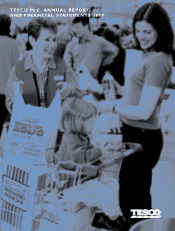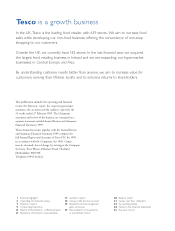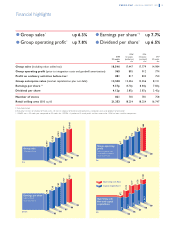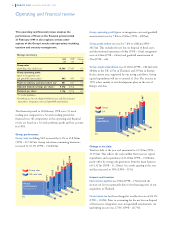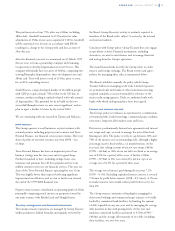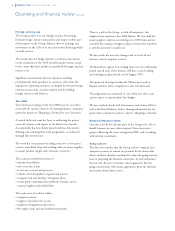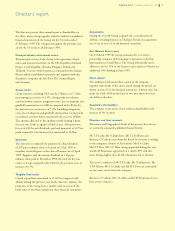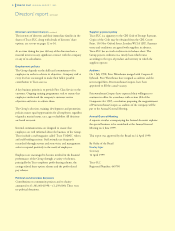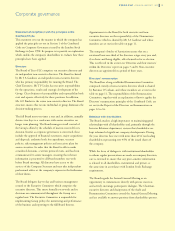Tesco 1999 Annual Report Download - page 8
Download and view the complete annual report
Please find page 8 of the 1999 Tesco annual report below. You can navigate through the pages in the report by either clicking on the pages listed below, or by using the keyword search tool below to find specific information within the annual report.
6 TESCO PLC ANNUAL REPORT 1999
Operating and financial review continued
Foreign currency risk
The Group’s policy is to use foreign currency borrowings,
forward foreign currency transactions and swaps to offset part
of the impact on the Group’s balance sheet of exchange rate
movements on the 12% of its net assets before financing which
are held overseas.
The Group does not hedge exposure to currency movements
on the translation of the 4.8% of profits made overseas except
to the extent that those profits are matched by foreign currency
interest costs.
Significant transactional currency exposures resulting
predominantly from purchases in currencies other than the
subsidiaries’ reporting currencies are hedged by forward foreign
currency transactions, currency options and by holding
foreign currency cash balances.
Year 2000
Tesco has been working on the Year 2000 issue for over three
years with the specific objective of ensuring business continuity
under the banner of ‘Shopping as Normal for our Customers’.
A central dedicated team has been co-ordinating the project
across all countries and reports to the Board every month.
Accountability has been firmly placed with line directors for
defining and actioning their work programme, co-ordinated
through this central team.
The work has concentrated on taking corrective action across
systems, embedded chips and working with our many suppliers
to ensure product supply and continuity of services.
The activities involved have been to:
• identify the problem
• take corrective action
• re-test new systems and processes
• validate external suppliers of goods and services
• categorise risk and develop contingency plans
• ensure good communication within the business and to
external suppliers and stakeholders
The main areas of work lie within:
• computer systems
• suppliers of products for re-sale
• suppliers of equipment and services
• the supply chain and our distribution network
There is a risk to the Group, as with all companies, that
suppliers may experience Year 2000 failures. We have held five
major supplier conferences involving over 2,000 firms and are
currently fine tuning contingency plans to ensure the transition
is smooth and trade is unaffected.
We have made the necessary changes and re-tested all our
business critical computer systems.
The Board have agreed store trading times over the millennium
period and all areas of the business will have created staffing
and contingency plans by the end of August 1999.
The approach developed within the UK has been used in
Europe and Asia where compliance is also well advanced.
The programme was estimated to cost £30m over three years
and we expect to spend within that budget.
We have worked closely with Government and Action 2000 as
well as the Retail Industry bodies, sharing information for the
good of the consumer in order to achieve ‘Shopping as Normal’.
Economic Monetary Union
Our aim is for all the relevant parts of the Group to be able to
handle business in euros when required. Tesco has project
groups addressing the issues arising from EMU and is working
with external consultants.
Going concern
The directors consider that the Group and the company have
adequate resources to remain in operation for the foreseeable
future and have therefore continued to adopt the going concern
basis in preparing the financial statements. As with all business
forecasts the directors’ statement cannot guarantee that the
going concern basis will remain appropriate given the inherent
uncertainty about future events.

